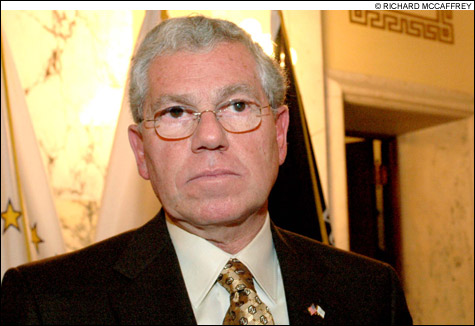As Governor Donald L. Carcieri celebrated his 64th birthday on December 16, he could take satisfaction in any number of things: a successful business career; a big family — with four children and more than a dozen grandchildren; and, most recently, his ability to withstand the national Democratic tide in November by winning a second term in Rhode Island’s top political office.

NEW DYNAMIC: Carcieri has to move swiftly and skillfully to get things done before lame duck status sets in.
|
Yet after storming the State House as a first-time candidate in 2002, successfully setting himself against the Democrat-controlled General Assembly, the GOP governor will clearly face tougher sledding when his second term begins next week. The recent defection to the Democrats of Representative Joseph Scott of Exeter, a longtime Republican, speaks volumes about the prevailing currents at the State House, where the ruling Democrats are stronger and more unified than in several years.
Little wonder, then, that Carcieri expresses occasional frustration about the difficulty of making change in government, as compared with the private sector. And while the governor can claim some real accomplishments, many of Rhode Island’s most serious problems — including continuing state deficits, an insufficient number of good jobs, and sharp disparities between rich and poor communities — remain basically unchanged from the time when he took office. More fundamentally, the man who arrived with a vow to challenge the system must move swiftly and skillfully to make the most of his time while inexorably moving toward lame duck status.
Here’s a look at some of the leading challenges facing Carcieri in the New Year.
Remain Relevant: The governor’s self-confidence, breezy manner, and strong communication skills help to obscure his politically disadvantageous position on Smith Hill, where Speaker William J. Murphy holds a far better hand than during the past two years. While Carcieri was previously able to form an alliance with dissident Democrats, Murphy has shored up his support, signaling the return of a stronger speakership.
Murphy spokesman Larry Berman says the speaker “certainly would like to work with the governor to move the state forward on issues such as economic development and getting their arms around the budget deficit.” While they have different opinions about the future of Quonset Point, Carcieri and Murphy worked together last year to support a tax cut for the wealthiest Rhode Islanders, so there’s a certain mind-meld at work.
Still, after Carcieri pursued a confrontational course toward the General Assembly during his first two years in office, and then a more collaborative one, it’s going to take a lot more of the latter to strike an effective working relationship with the legislature and its various constituencies.
Solve The Deficit, Part One: Noting the trend in which expected deficits have turned into surpluses, Carcieri has sounded a bullish response to concerns about a deficit pegged this year in the area of $105 million.
Some observers, though, don’t share the governor’s optimism. The thinking is that it could prove difficult to counter diminishing state revenues, which are due to declining car and home sales, less money than anticipated from Lincoln Park, and growing costs in the Department of Corrections and some other departments. “Obviously, balancing the budget is the biggest challenge, and it’s a short- and a long-term challenge,” notes Gary Sasse, executive director of the Rhode Island Public Expenditure Council.
As the ProJo reported earlier this month, these deficits have led directors of state departments to propose a variety of previously rejected cuts, including the layoff of 54 state troopers in the patrol division and the release of minimum-security inmates from the Adult Correctional Institutions.
Will the current deficit compel difficult decisions or melt away like those in the past? Stay tuned. Carcieri's own strategy for contending with this should come into sharper focus in January and February.
Solve the Deficit, Part Two: As Sasse suggests, a structural deficit extends the fiscal bleakness to the long-term state budget outlook, estimated to be about $250 million for the next fiscal year.
As Sasse explains it, three areas form about 90 percent of the state budget: personnel (about 25 percent); local aid (about 20 percent); and grants, benefits, and entitlements (more than 40 percent). Curbing growing spending in these areas, Sasse says, “will require hard choices and leadership by the governor to lay out a plan, and a much higher level of bipartisanship to come up with solutions . . . At some point, we really need to address it.”
While reducing spending on entitlements will not be easy, in part because of the strong constituencies in those areas, Sasse suggests that savings can be realized through streamlining delivery and other approaches. Meanwhile, he says, the structural deficit is impeding the state’s ability to make investments in higher education and other important areas. “It’s like we’re fighting the battle with one arm tied behind our back,” Sasse says.
Rebuild the RI GOP: An implicit and vital part of Carcieri’s promise to challenge the status quo of Rhode Island politics was strengthening the ranks of GOP legislators on Smith Hill. But after some modest gains in 2004, the effort veered sideways during the recent election season.